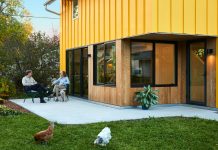Photos by Mette Nielsen, courtesy of UMN Press
As a follow-up to the James Beard Award-winning cookbook she wrote with chef Sean Sherman, Beth Dooley takes a deep dive into local, regenerative (or sustainable) agriculture in her new book, “The Perennial Kitchen: Simple Recipes for a Healthy Future.”
Regenerative agriculture , according to Regeneration International, an international nonprofit, “describes farming and grazing practices that, among other benefits, reverse climate change by rebuilding soil organic matter and restoring degraded soil biodiversity—resulting in both carbon drawdown and improving the water cycle.” Several Minnesota farmers and organizations are at the forefront of this climate-saving approach to food production.
, according to Regeneration International, an international nonprofit, “describes farming and grazing practices that, among other benefits, reverse climate change by rebuilding soil organic matter and restoring degraded soil biodiversity—resulting in both carbon drawdown and improving the water cycle.” Several Minnesota farmers and organizations are at the forefront of this climate-saving approach to food production.
One of them (whom Dooley writes about in the Flour Power section of her book) is Carmen Fernholz of A-Frame Farm in Madison, MN. A long-time organic farmer, Fernholz is one of the first in the state to grow Kernza in collaboration with the University of Minnesota’s Forever Green Initiative. “Flour milled from Kernza,” Dooley writes, “has a distinct nutty, earthy flavor (similar to rye). Its gluten content is lower than wheat flour, so it behaves differently in baked foods.”
Want to give Kernza a try? Dooley provides resources at the back of the book for ordering the flour. She also has a can-do recipe for multigrain crackers made with Kernza. Also in her “perennial pantry” are grains including oat groats, wild rice, and dried field corn; beans ranging from Arikara to Tiger’s Eye; cooking oils made from nuts; and natural sweeteners. Many of these ingredients may not seem out of the ordinary to adventurous cooks, and her recipes don’t require arduous, time-consuming culinary practices.

Dooley’s goal, really, is to connect readers with the farmers, ranchers, processors, and artisans—many of them Black, Indigenous, and POC—who are boldly growing grains, beans, meats, fruits, and vegetables in ways that build up, rather than degenerate, our soil and water. As she writes: “The sum of our daily choices will ultimately impact our collective future. If you’re hungry for hope and comfort, cooking is a great place to start.”
Available May 2021 and distributed by University of Minnesota Press. $27.95.






















